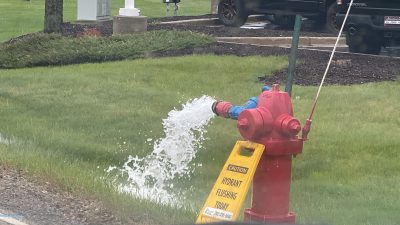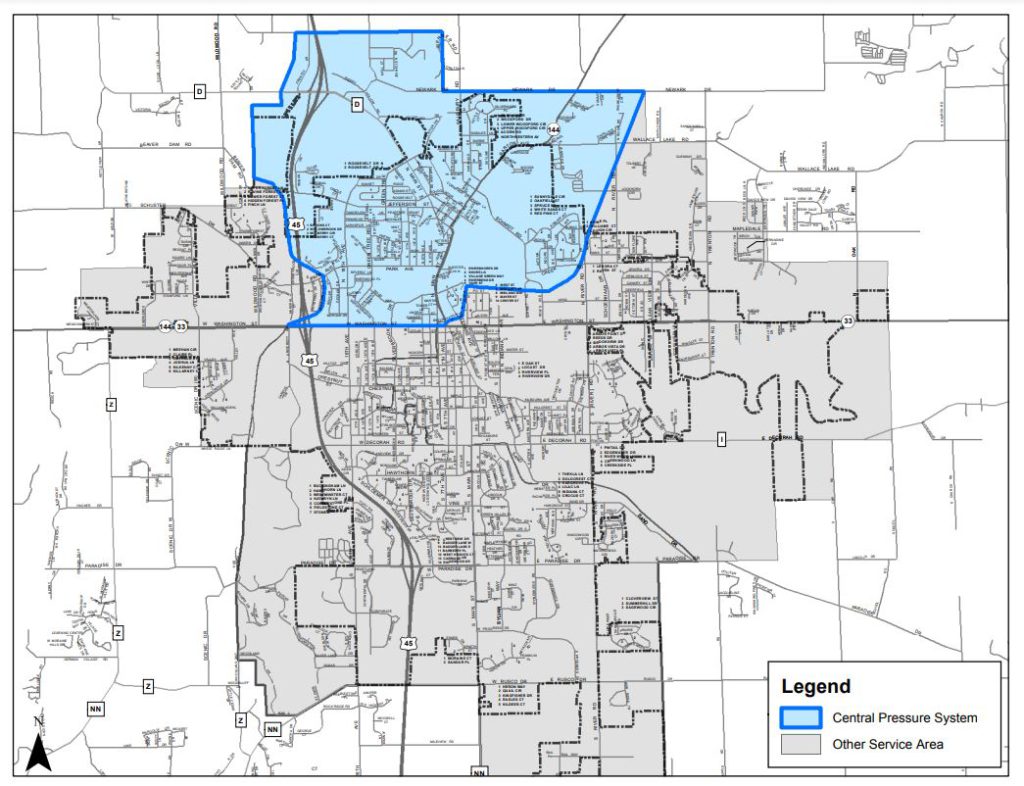June 9, 2022 – West Bend, WI – On Tuesday, June 7, 2022 the City of West Bend notified the community about three wells on the north end of town that had levels of a chemical component above the Wisconsin Department of Health Services and U.S. Environmental Protection Agency’s non-regulatory health advisory levels. The wells provide drinking water.
According to Ruth Mueller, utility director, following a system sampling per- and polyfluoroalkyl substances (PFAS) were found in the wells.
Environmental Working Group (EWG) says highly toxic fluorinated compounds known as PFAS are found in a number of areas including clothing, non-stick cookware products, wrappers for bakery and fast food. Click HERE for more information.

Click HERE to explore PFAS contamination map for West Bend
Mueller indicated three wells were affected; all in the Central Pressure System, detected PFAS. Well No. 4 was the only well to indicate levels above the Wisconsin Department of Health Services and U.S. Environmental Protection Agency’s non-regulatory health advisory levels in drinking water.

According to Mueller there are nine wells in the City of West Bend, however they are not numbered chronologically. The last sampling of the wells for a meter reading was taken May 16, 2022.
“We did not receive those results until June 1, and then we shut the well down on June 2, those were the results that came in over the level,” said Mueller.

The public was notified about the latest sampling on Tuesday, June 7, 2022; five days after the well was shut down, six days after the sample results were received and 22 days after the sample was taken.
Click HERE to SUBSCRIBE to FREE local news at
Washington County Insider on YouTube
Mueller said this is the first time the well exceeded the testing level.
“There were only three wells that had detects in the city,” said Mueller. “They all were in the north system, or the central north system, let’s just call it a central system to stay consistent.”
Questioned whether customers have noticed a smell or a taste issue, Mueller said, “Not the best of our knowledge. No.”
Information below is from the epa.gov

Questioned if anybody would have become sick if they drank the water between the time it was sampled and the time the well was shut down, Mueller said, “We’re not health experts; we can’t answer those questions.”
Mueller said neighbors are still able to access water, even though well No. 4 is shut down.
“Yes, there are three wells in that system,” she said. “Well No. 11 and No. 12 are also in that system. They are continuing to operate, and we do not see a problem with shutting down well No. 4. There will be no interruption in the supply of water.”
Questioned how the situation will be rectified, Mueller said, “Right now the well is going to remain offline until we determine how to proceed. At this time, we’re still in the investigatory process. We really don’t know exactly how we’re going to proceed, there are several options out there available.”
Mueller could not put a timeline on the repair. She also did not think there would be any need to have any water restrictions.
The wells on the north end are separate and according to Mueller they cannot cross contaminate one another.
Well No. 4 dates to 1939.
Samplings, according to Mueller, don’t happen monthly. “We’ve been sampling every six months,” she said.
A link to all the sampling is on the city’s web page. That link will be connected shortly.
Questioned if the numbers were rather shocking Mueller said, “I really can’t answer because it’s not something that’s regulated that we need to follow. And these numbers did change. I mean, they go up, they go down, it varies. So, we were testing for them proactively. We found them and we address the issue.”
According to the city: Drinking water, including bottled water, may reasonably be expected to contain at least small amounts of some contaminants. The presence of contaminants does not necessarily indicate that water poses a health risk. More information about contaminants and potential
health effects can be obtained by calling the Environmental Protection Agency’s safe drinking water hotline (1-800-426-4791).
Some people may be more vulnerable to contaminants in drinking water than the general population. Immuno-compromised persons such as persons with cancer undergoing chemotherapy, persons who have undergone organ transplants, people with HIV/AIDS or other immune systems disorders, some elderly and infants can be particularly at risk from infections. These people should seek advice about drinking water from their health care providers. EPA/CDC guidelines on appropriate means to lessen the risk of infection by cryptosporidium and other microbial contaminants are available from the Environmental Protection Agency’s safe drinking water hotline (1-800-426-4791).
Please direct any questions to Ruth Mueller, Utility Director, 262-335-5040 or muellerr@ci.west-bend.wi.us








